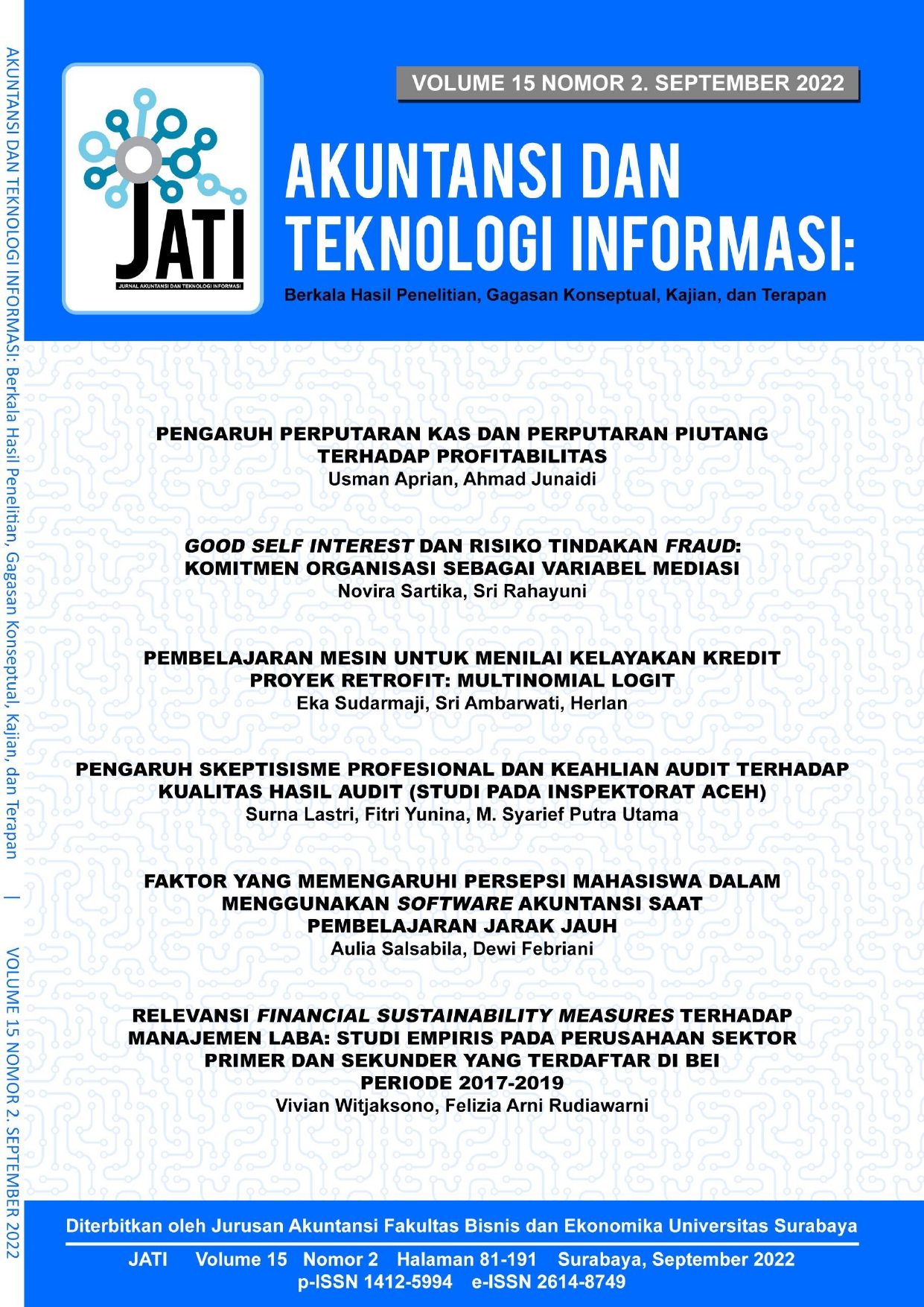GOOD SELF INTEREST DAN RISIKO TINDAKAN FRAUD: KOMITMEN ORGANISASI SEBAGAI VARIABEL MEDIASI
 Abstract Views:
379 times
Abstract Views:
379 times
 PDF Downloads:
366 times
PDF Downloads:
366 times
Abstract
This study aims to determine the effect of good self-interest on the risk of fraud with organizational commitment as a mediating variable at the Regional Apparatus Organization (OPD) in Bengkalis City. This study uses a quantitative approach and primary data. The population in this study were employees at OPD in Bengkalis City with the total sample are 78 respondents using purposive sampling technique with the criteria of employees with functional tenure more than 2 years. The data were analyzed using path analysis with the help of SPSS Version 25. The results showed that good self-interest has a significant effect on the risk of fraud with organizational commitment as a mediating variable. So, the higher good self-interest and added the organizational commitment of an employee, can decrease the risk of fraud because the employee will do the best for the organization.
Downloads
References
Barbalet. J, (2012), Self-interest and the theory of action, The British Journal of Sociology, Vol. 63 (3), hal. 412 – 429.
Bestari, D. S. (2016). Pengaruh Keefektifan Pengendalian Internal, Asimetri Informasi, dan Moralitas Individu Terhadap Kecenderungan Kecurangan Akuntansi dengan Perilaku Tidak Etis sebagai Variabel Interventing (Studi Empiris pada Satuan Kerja Perangkat Daerah Provinsi Riau). JOMFekom, 4(1), 843–857. https://media.neliti.com/media/publications/125589-ID-analisis- dampak-pemekaran-daerah-ditinja.pdf.
Chandra, D. P. (2015). Determinan Terjadinya Kecenderungan Kecurangan Akuntansi (Fraud) Pada Dinas Pemerintah Se Kabupaten Grobogan [Universitas Negeri Semarang]. In Accounting
Analysis Journal (Vol. 4, Issue 3). https://doi.org/10.15294/aaj.v4i3.8308.
Isfandiar, A. A. (2015). Melacak Teori Rasionalitas Ekonomi berbasis Islamic Ethics. Muqtasid: Jurnal Ekonomi Dan Perbankan Syariah, 6(2), 23. https://doi.org/10.18326/muqtasid.v6i2.23-41.
Javier, F. (2021, September). ICW: Angka Penindakan Kasus Korupsi Semester 1 2021 Naik Jika Dibandingkan Tahun Sebelumnya. Data.Tempo.Com, 1. https://data.tempo.co/data/1208/icw- angka-penindakan-kasus-korupsi-semester-1-2021-naik-jika-dibandingkan-tahun-sebelumnya.
Ma’rufi, A. R., dan Anam, C. (2019). Faktor yang mempengaruhi komitmen organisasi. Prosiding Seminar Nasional Magister Psikologi Universitas Ahmad Dahlan, 442–446. http://seminar.uad.ac.id/index.php/snmpuad/article/download/3458/788.
Marliza, R. (2018). Pengaruh Personal Cost of Reporting, Komitmen Organisasi, dan Tingkat Keseriusan Kecurangan Terhadap Niat Melakukan Whistleblowing (Studi Empiris pada Organisasi Perangkat Daerah Kota Payakumbuh).
Meurah, A., dan Aida, F. F. (2018). Pengaruh Komitmen Organisasi, Etika Organisasi, Keadilan Kompensasi, Dan Sistem Pengendalian Internal Terhadap Fraud (Studi Empiris Pada Skpd Pemerintah Kota Lhokseumawe). Jurnal Ilmiah Mahasiswa Ekonomi Akuntansi (JIMEKA), 3(3), 527–537.
Nafiraihan, T. (2019). Risiko Fraud. https://www.academia.edu/41335020/RISIKO_FRAUD. Natasya, T. N., Karamoy, H., dan Lambey, R. (2017). Pengaruh Komitmen Organisasi Dan
Pengendalian Internal Terhadap Resiko Terjadinya Kecurangan (Fraud) Dalam Pelaksanaan Jaminan Kesehatan Di Rumah Sakit Bhayangkara Tk. Iv Polda Sulut. Going Concern : Jurnal Riset Akuntansi, 12(2), 847–856. https://doi.org/10.32400/gc.12.2.18274.2017.
Nugroho, I. M., dan Stephanus, D. S. (2015). Penilaian Risiko Fraud (Fraud Risk Assessment). https://danielstephanus.wordpress.com/2018/10/31/penilaian-risiko-fraud-fraud-risk- assessment/.
Pramudya, W. (2010). Melampaui Self Interest. https://indoprogress.com/2010/01/melampaui-self-interest/.
Twiyogarendra, J. W., Rahma, U. H., Rifqi, A. N., Mulyadi, D. M., dan Fairuz, M. F. (2019). self interest (SI) dan Other Orientation (OO) dalam perilaku organisasi.

This work is licensed under a Creative Commons Attribution-ShareAlike 4.0 International License.
- Copyright on articles is retained by the respective author(s), without restrictions. A non-exclusive license is granted to Akuntansi dan Teknologi Informasi (JATI) to publish the article and identify itself as its original publisher, along with the commercial right to include the article in a hardcopy issue for sale to libraries and individuals.
- Articles published in Akuntansi dan Teknologi Informasi (JATI) are licensed under a Creative Commons Attribution-ShareAlike 4.0 International license. You are free to copy, transform, or redistribute articles for any lawful purpose in any medium, provided you give appropriate credit to the original author(s) and the journal, link to the license, indicate if changes were made, and redistribute any derivative work under the same license.
- By publishing in Akuntansi dan Teknologi Informasi (JATI), authors grant any third party the right to use their article to the extent provided by the Creative Commons Attribution-ShareAlike 4.0 International license.

 DOI:
DOI:









